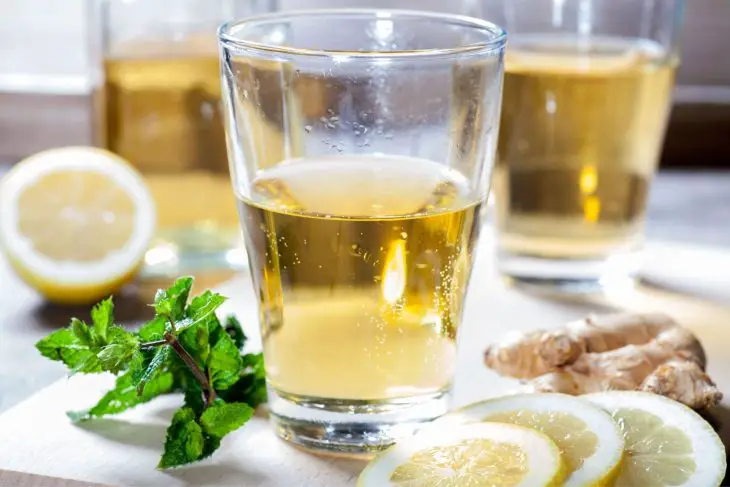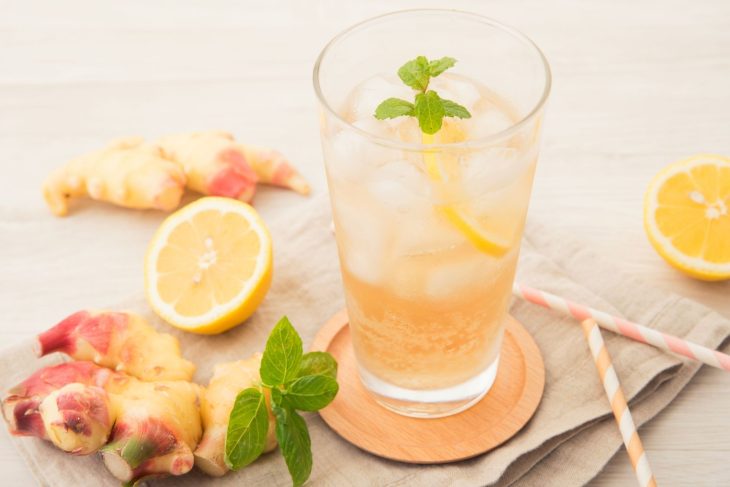Hey there! This site is reader-supported and we earn commissions if you purchase products from retailers after clicking on a link from our site.
Ginger beer, ginger ale. You can do a lot with ginger-flavored things, especially when it comes to alcohol. For example, you might pass up a delicious craft brew for a Moscow Mule, Gin Buck, or a Presbyterian (that’s a Scottish Highball). And even if you’re familiar with ginger ale just as a cure-all for nausea and stomach problems, there is no denying the zing of it is delicious. So, you might be wondering, as you reach for an ice cold can of ginger ale, whether it’s a healthy choice or if you’re better off just grabbing a beer.
We’ve got some news for you!
What is Ginger Ale?

Ginger ale is carbonated and flavored with the ginger spice. Most often, ginger ale is classified as a soda by manufacturers, because the beverage is made by combining carbonated water, high fructose corn syrup or sugar, and either natural or artificial ginger flavor. Sometimes, ginger ale will contain caramel coloring and preservatives, such as sodium benzoate or citric acid.
Traditional ginger ale often contains a ginger bug or yeast as part of a microbial starter culture. What’s a ginger bug? It’s not an insect (thank goodness) but a SCOBY, or culture, like the ones used to make kombucha or sourdough bread. Ginger bug is produced from either fresh ginger root or the ginger beer plant. During the fermentation process, bacteria and yeast create carbonation.
So, there are two main varieties of ginger ale: commercial soda or traditional. The commercial brands tend to be more artificial, while traditional ginger ale contains more natural ingredients.
Types of Ginger Ale
Aside from the division between artificial and natural, there are three types of ginger ale you’ll find on the market shelves:
- Regular. This is the generic ginger ale as we described in the previous section. Most blends use sugar or high fructose corn syrup, ginger (natural or artificial), and carbonation. Depending on the brand, other ingredients may be used.
- Dry. A marketing term denoting a spicier flavor, usually created by processing ginger root differently than regular ginger ales.
- Diet. A ginger ale that contains calorie-free sweeteners and artificial flavors in lieu of sugar.
Ginger Ale Benefits

So are the old wives’ tales of drinking ginger ale to cure a stomach ache true? Ginger ale isn’t consider a superfood or even a health food, and the benefits are largely derived from the quality of the ginger used.
Ginger ale itself may have few benefits if there is no real ginger involved. With that in mind, here are some known benefits of ginger root—powdered, ground, or whole:
- Migraine treatment. Powdered ginger root has been found to improve the symptoms of migraines.
- May reduce nausea. Compounds in ginger, known as shogaols and gingerols, are known to relieve the feeling of an upset stomach. However, most studies only look at ginger itself, not ginger ale. Another compound, zingibain, is known to fight the cold and flu.
- Antioxidant effects. Ginger oil has antioxidants that protect against cellular damage. Unfortunately, the level of antioxidants drop with processing.
- Reduces inflammation. Ginger is believed to be an anti-inflammatory, particularly for the joints.
- Healthy for the heart. Natural ginger root may lower blood pressure, decreasing the risk of stroke or heart disease.
What is the Healthiest Ginger Ale? The Worst?
Want to know which ginger ale is healthy to drink? Let’s first talk about which ones you should avoid.
There are a couple of brands that, surprisingly, contain very little to no ginger in the ingredients, despite being incredibly popular. You probably know them: Canada Dry and Schweppes Ginger Ale. Canada Dry may have pioneered ginger ale, but the amount of ginger in their soda is only 2%. Meanwhile, Schweppes is even worse; they use no ginger in their ginger ale.
That means Canada Dry and Schweppes both contain too little ginger for you to get any of the benefits.
Now, what is the healthiest brand of ginger ale? Turns out, there’s a tie. Reed’s Ginger Ale contains real ginger (listed as pressed organic ginger), as does Blenheim Ginger Ale. This means you’ll get the benefits of ginger from both these brands.
Which Ginger Ales Have Real Ginger?
Ginger ales that contain ginger in the ingredient list include:
- Reed’s Ginger Ale
- Blenheim Ginger Ale (Hot, Not as Hot, and Diet)
- Q Ginger Ale
- Fever-Tree Premium Ginger Ale
An honorable mention is Blue Sky Ginger Ale soda. It says it’s flavored by nature, so it contains all-natural ingredients (but doesn’t actually list ginger). But Blue Sky does have less sugar than average and don’t use preservatives or harsh chemicals.
Does Ginger Ale Have A Lot of Sugar?
The amount of sugar used in a ginger ale depends on a couple of things: the brand and the ingredients used. For instance, Canada Dry ginger ale contains 140 calories in a 12 oz can. There is no fat or protein content, only carbohydrates in the form of 35 grams of sugar from high fructose corn syrup. To put that into perspective, a single donut has 10 grams of sugar. A fruit-on-the-bottom yogurt averages around 22g of sugar.
In other words, you’re drinking straight sugar—and a lot of it. Now, while there are no daily recommended amounts for sugar, the American Heart Association says that women should limit added sugars to about 25g, and men should limit to 36g per day.
Is all-natural ginger ale the same way? Yes. Consider Reed’s Ginger Ale, which is all-natural and non-GMO. The ingredients still contain 33g of added sugar.
Is Ginger Ale Bad for Weight Loss?
As a drink laden with sugar, ginger ale shouldn’t be considered a weight watcher’s best friend. Nearly every brand has about 140 calories per 12 oz serving. Sugary drinks are known to cause weight gain, as well as elevate blood pressure and the risk of chronic diseases. In fact, if you drink 1-2 sugary drinks a day, you have a 26% greater chance of getting type 2 diabetes.
You could go with diet, but those are often artificially sweetened and rife with chemicals to make the beverage taste passable. In a meta-analysis by the Canadian Medical Association Journal, it was found that artificial sweeteners are even worse for you than real sugar. In the long term, sweeteners increase your risk of weight gain, diabetes, high blood pressure, heart disease, and obesity.
Of course, this is all referring to sugar and artificial sweeteners used in excess. If you enjoy a serving of ginger ale in moderation and make smart lifestyle choices, you shouldn’t have to worry about weight gain.
Can Ginger Ale Raise Your Blood Pressure?
Sugars contribute to high blood pressure; ginger ale, being a high sugar drink, could raise it. A higher sugar intake can significantly increase both systolic and diastolic blood pressure by 7.6/6.1 mm Hg, according to one major study from 2014. If you already have high blood pressure, you may want to limit or even avoid drinking sugary sodas like ginger ale.
Final Thoughts on Ginger Ale Benefits
Ginger ale makes a wonderful mixer, and you can even grate ginger root and put it into your beer. But you have to find the good stuff—and we mean, the good stuff—to really get any health benefits out of it. Unless the ginger ale you’re drinking contains a copious amount of ginger, you probably won’t get many health benefits. That said, ginger ale is refreshing and flavorful, so enjoy it in moderation or as a way to soothe an upset belly.

